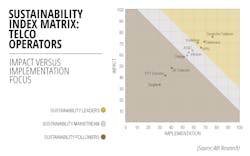Which CSP Leaders Should Others Follow in Sustainability Initiatives?
Companies around the globe have created climate-related targets for reaching net zero carbon emissions, and telecommunications providers are leading the charge. These telco operators are at the intersection of the communications and information technology, putting them in a unique position to offer connectivity and technological solutions that are not only lowering their own carbon emissions but also the emissions of their customers.
Each of the leaders in the index has transitioned to using more than 50% renewable energy for global purchased electricity and two have reached 100%. The use of renewable energy has reduced the leaders’ total carbon emissions by 8.4 million metric tons of carbon dioxide (CO2e), which is equivalent to removing the CO2 emissions of 1.8 million passenger vehicles for one year, or 19.4 million barrels of oil consumed.
The mainstream selections, such as AT&T, Verizon, and Orange, were all very strong in 5G and fiber deployment, and these companies led the index, along with SK Telecom, for network upgrades. However, the mainstream companies lagged the leaders in global percent use of renewable energy for the networks.
All operators need to focus on the largest source of carbon emissions, which is energy consumption of their networks. The most sustainable companies, though, have a comprehensive strategy, including the deployment of technologies such as 5G, AI, and automation, an in-depth waste recycling program, employee compensation tied to climate targets, and active engagement with suppliers and customers, upstream and downstream from the company’s own operations.
Deutsche Telekom finished first overall in the assessment, followed by Telefónica, Vodafone, and KPN. Deutsche Telekom has received numerous awards globally and regionally for its sustainability reporting. The company also emerged as a leader in European 5G and fiber, while its subsidiary, T-Mobile US, also a leader in 5G, announced in early 2022 that it had become the first US provider to source 100% of its electricity from renewable energy sources, helping the global Deutsche Telekom Group reach 100% renewables worldwide. T-Mobile reported zero percent renewable energy use just a few years ago in 2017, and this transition to 100% occurred during a historic merger with Sprint.
Telefónica led the index in several areas, such as energy efficiency, waste recycled, eco-design, and green bonds, while Vodafone had strong performances in energy efficiency, waste recycled, overall sustainability reporting, and conversion of fleet vehicles to electric vehicles. KPN, an over achiever in sustainability, has been using green electricity since 2011 and has been carbon neutral since 2015. KPN was the smallest operator in the index and did not lead in network upgrades, 5G deployment, or scale of impact; however, the company is a global sustainability leader from every other perspective.
These telco operators are at the intersection of communications and information technology, putting them in a unique position to offer connectivity and technological solutions that are not only lowering their own carbon emissions but also the emissions of their customers.
The mainstream selections, such as AT&T, Verizon, and Orange, were all very strong in 5G and fiber deployment, and these companies led the index, along with SK Telecom, for network upgrades. However, the mainstream companies lagged the leaders in global percent use of renewable energy for the networks. SK Telecom, NTT DoCoMo, and Singtel emerged as followers, primarily due to challenges in their regions for sourcing renewable energy (the companies are still close to zero percent for renewable energy use, despite future pledges), and for less breadth and depth in overall sustainability tracking and reporting.
Additional report highlights include:
- Market trends or shifts in sustainability for telco operators: In April 2021, the Global System for Mobile Communications Association (GSMA) reported that mobile operators covering 50% of global connections and 65% of industry revenue have now committed to science-based climate targets.
- Thirty “Action Items” for sustainability: The ABI Research Sustainability Index identifies 30 action items or specific steps that telco operators can take to get to net-zero carbon emissions.
- 5G and Sustainability: The Sustainability Index also addresses how operators can rollout 5G without substantially increasing energy consumption. This process will require a multitude of innovative solutions for increasing the energy efficiency of today’s networks.
We acknowledged in the index that different regions face different geo-political, cost, and infrastructure barriers for sourcing renewable energy. For example, Korea is the fourth largest importer of coal, after China, India, and Japan. This makes early mover advances, such as SK Group in Korea joining the RE100 coalition and pledging 100% renewable energy use by 2050 and NTT DoCoMo pledging 100% renewable energy by 2030 even more critical to global climate efforts.
The big picture in producing the Sustainability Index is to highlight the sustainability best practices across the telecommunications industry with the goal of further reducing carbon emissions for all.
These findings are from ABI Research’s Sustainability Index: Telco Operators report. This report is part of the company’s Sustainable Technologies research service, which provides actionable research and data designed to help companies go from sustainability pledges to sustainability execution by identifying technologies, suppliers, and programs that accelerate sustainability efforts, such as reducing carbon emissions.
ABOUT THE AUTHOR
Kim Arrington Johnson, Principal Analyst, provides coverage for the Sustainable Technologies group at ABI Research. The Sustainable Technologies service analyzes company efforts toward sustainability goals, identifies technologies to help reduce emissions and increase environmental impact, and provides companies the tools, best practices, and insights to go from sustainability pledges to sustainability execution. Kim has nearly 25 years of experience in aviation, finance, and writing and research.
For more information, visit www.abiresearach.com. You can also follow them on Twitter @ABIresearch and LinkedIn: https://www.linkedin.com/company/abi-research/
About the Author
Kim Johnson
Principal Analyst, ABI Research
Kim Arrington Johnson, Principal Analyst, provides coverage for the Sustainable Technologies group at ABI Research. The Sustainable Technologies service analyzes company efforts toward sustainability goals, identifies technologies to help reduce emissions and increase environmental impact, and provides companies the tools, best practices, and insights to go from sustainability pledges to sustainability execution. Kim has nearly 25 years of experience in aviation, finance, and writing and research.
For more information, visit www.abiresearach.com. You can also follow them on Twitter @ABIresearch and LinkedIn: https://www.linkedin.com/company/abi-research/.


